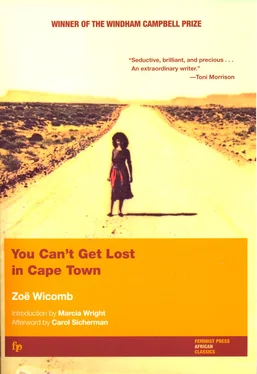You Can’t Get Lost in Cape Town details Frieda’s coming of age, revealing the impact of Frieda’s experiences on her maturing consciousness. Part of what is narrated is Frieda’s changing perspective; in the course of the book, her own point of view undergoes profound transformations. Wicomb’s brilliant command of this shifting narrative ground is revealed in “A Clearing in the Bush” and “A Fair Exchange.” “A Clearing in the Bush” alternates between Tamieta’s story and Frieda’s, illuminating the class differences that separate these two coloured women, both from the country and now both at the university: Tamieta as a canteen worker, Frieda as a student. Tamieta knows Frieda and her “father who drives a motor car” (46) — his material triumph underlining his middle-class status, however uncertain it may be. To Tamieta, Frieda is “the Shenton girl” (48), her social class making her too remote to matter much. To Frieda, Tamieta is barely noticeable, and the story demonstrates the young Frieda’s failure of imaginative sympathy. But when the mature Frieda returns from her alienating residence in England with a more developed social consciousness and a more capacious imagination, she listens so well to Skitterboud, an unschooled Griqua shepherd, that she can tell his story and even submit to his reproof. The humility of her submission is another kind of triumph; we learn only toward the end of “A Fair Exchange” that she herself has written this account, and her listening and questions become part of the story.
Throughout You Can’t Get Lost in Cape Town , as the South African scholar Dorothy Driver writes, “there is rarely a moment at which any one judgment rests without being nudged or more directly interrogated by another.” 4The very title of the book, which draws on a sentence spoken by Frieda’s white boyfriend (73), throws out a challenge: to say you implies a speaking I , and in the title story, Michael’s you excludes Frieda’s I . Michael’s breezy assurance betrays the fault of white liberalism in South Africa: the dominant minority group controls assertions of “fact,” denying the felt experience of the dominated majority. The moment likewise reflects a male dismissal of female experience. Although Frieda is not literally lost, for she does get off the bus at the prearranged spot, she remains lost in a world without clear psychic navigational guides, left to form her own sense of direction by seeking — and questioning — truths.
Wicomb’s readers, too, may sometimes feel lost in a book requiring constant reassessment of what they thought they knew. Words like ambivalence and ambiguity characterize critical writing about Wicomb’s work; they also characterize her own fiction and essays. Even the question of genre — a novel? stories? — is difficult to settle. Frieda is the “focal character” in most stories, so the book is indeed, as Wicomb says in an interview with Eva Hunter, “novel-like”; 5yet “the gaps between the stories” preclude calling it a novel, for Wicomb has deliberately created what she describes as “chaos on the page” in order to unmask “the camouflage of coherence that socio-political structures are about.” 6Like much other twentieth-century literature that reflects the incoherent quality of history, this postmodern book challenges its readers to make tentative sense out of its gaps and inconsistencies — to search for patterns of meaning in its revisionary fabric and, in doing so, to question our definitions of literature and of “truth.”
II
Wicomb’s readers will recognize right away that she is out to challenge them, just as she challenges her protagonist, and just as she challenges herself. She shares with her flawed heroine a stubborn independence of mind and a hard-won courage to look steadily at what remains when a “fastidious” God flees humankind (81). The most obvious example of the courage to change one’s mind comes at the very end of the book — and for that reason, anyone who relishes surprise should finish the book before reading the present paragraph. We may think we know that Mrs. Shenton dies while Frieda is a child; we may even have admired her widower-father’s valiant, if awkward, efforts to raise his motherless child. But the final story challenges and undermines our understanding. Resurrecting a supposedly dead mother, Wicomb forces us to acknowledge that Frieda is a fictional character distinct from Wicomb herself.
Near the end of You Can’t Get Lost in Cape Town , Mrs. Shenton angrily suggests that because Frieda has “used the real” for some of her details, people will suppose her stories to be autobiography (172). Wicomb has, at times, suffered the same fate at the hand of reviewers and critics. “In a sense,” Wicomb has confessed, “I deliberately flirted with autobiography, almost maliciously catching my reviewers out.” 7In reality, as in the book, the process is considerably more complex. Like many writers, Wicomb has “drawn extensively on [her] own experience” for such details as dung-smeared floors, for characters who are “amalgams of various people [she has] known,” and for elements of family stories. 8Born, like Frieda, on the edge of Namaqualand in 1948, Wicomb grew up in a Griqua village with “a little school but no shop,” so remote that “there were still old people who spoke the old Khoi language.” The men were employed as laborers in the gypsum mines or on farms, the women as domestic servants in nearby towns. 9Wicomb’s parents, like Frieda’s, were Afrikaans-speakers who “identified English as a way out of oppression,” her mother encouraging Wicomb and her brothers to speak in the imported BBC accents of South African radio newsreaders. 10
Wicomb, like Frieda, studied English literature at the Afrikaner-dominated coloured University of the Western Cape (B.A. 1968) and in 1973 left for exile in Britain. Enrolling for an honours degree in English at Reading University (B.A., 1979), she discovered that a graduate of the University of the Western Cape was worse educated than a student who had completed the college preparatory course at a British secondary school. 11During the next ten years, Wicomb taught in schools and in adult education, worked in the anti-apartheid movement, wrote You Can’t Get Lost in Cape Town , and took a master’s degree in literary linguistics (1989) at Strathclyde University in Glasgow. Then, in 1991, feeling herself “an alien in Britain,” 12she returned to South Africa to teach at her greatly transformed alma mater. Moving back to Scotland in 1994, she now teaches in the Department of English Studies at Strathclyde University. She has recently completed her second full-length work of fiction, a novel entitled David’s Story , forthcoming from The Feminist Press in fall 2000.
Whether in South Africa or in exile, Wicomb has contributed to the revitalization of South African intellectual life. She was a founding editor of the Southern Africa Review of Books, a journal initially produced by exiles in Britain, to which she has contributed reviews and essays. In trenchant essays, she trains an unflinching eye not only on the “new” South Africa but also on the inescapable legacy of the old. One element of her nonfiction relevant to You Can’t Get Lost in Cape Town is her feminism. Wicomb credits “black consciousness” and “feminism” equally in giving her the courage to write, and she calls herself “a black feminist.” 13
Apartheid has affected not only Wicomb’s mind and imagination but also the publication history of You Can’t Get Lost in Cape Town . When, in 1987, the book first appeared in Britain and the United States, official South African censorship made publication at home impossible, and there is still no South African edition. Despite the work’s watershed status as the first book of fiction by a coloured South African woman set in South Africa, 14critical reception in South Africa has been slow, although certain South African critics, like Driver, have recognized that the book offers “a new mode in South African writing.” 15That the work is written by a coloured woman and features a coloured woman protagonist may, in fact, help to explain the relative lack of notice, as does the date of publication. Annemarié van Niekerk, in her review of the book in the South African journal Staffrider , describes how male dominance of South African intellectual life has marginalized black and coloured women writers. 16In the late 1980s, the final convulsions of the apartheid era produced oppositional reductive binaries described by André Brink as “us and them, black and white, good and bad, male and female.” 17With South African ears deafened by literal and figurative explosions, few could hear Wicomb’s quiet complexities. Yet another reason for neglect may be that as an exile, Wicomb was what South Africans call an “outside” writer.
Читать дальше












